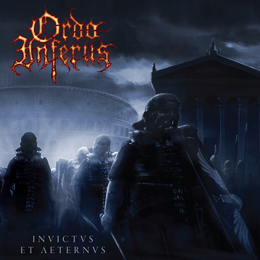
The glorious history, including rise and fall, of the Roman Empire, has been used as lyrical theme by dozens of (Metal) bands before. This goes as well for Ordo Inferus, a young Swedish act with members of e.g. Necrophobic, Excruciate and Nifelheim. Last year they surprised Mater Terra with the short yet highly interesting EP Damnati, and now Ordo Inferus return with their debut full length, Invictus Et Aeternus, done via major Doomentia Records.
With Invictus Et Aeternus, this Swedish cohort brings forty eight minutes of Traditional Death Metal with more than just one hint of tradition, and then I am referring to the Swedish Old School, one of the most important scenes that made the current scene as important and interesting. Without those basics, we wouldn’t have to enjoy etc… etc… etc…
Lots of bands try to do so, but in Ordo Inferus’s case, we do not have to deal with another, xxx-th clone. Yes, they certainly draw inspiration from the eighties’ scene, and why shouldn’t they anyway? There are so many bands / projects that do so, and some of them are successful, while others totally loose the basics. When it comes to this act, Ordo Inferus, I am tending to focus on a pure, essential profile, skipping the usual entombish-oriented grooves or dismember’d aggression, yet maintaining the purest essential aggression by the originators of Swedish Hell (any clue what I am trying to define?... If not: F***; if yes, please continue…). Or to keep it short: Ordo Inferus translate the origins of Swedeath with that specific Roman atmosphere into a timeless yet mostly energetic and up-tempo based sonic experience. It’s not as impressive as, let’s say, Ex Deo (which band, ever, will be able to reach the same level of these Canadians anyway?), but I am sure the initial Roman governors will prefer this stuff as their sonic trademark. And personally, once again, I do really like the slower passages (cf. the introduction to Divinatio Tusculana, amongst others).
